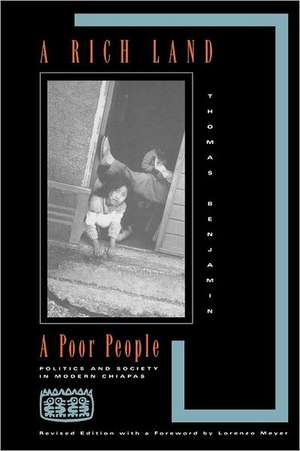A Rich Land, a Poor People: Politics and Society in Modern Chiapas
Autor Thomas Benjamin Lorenzo Meyeren Limba Engleză Paperback – 30 apr 1996
Preț: 287.50 lei
Nou
Puncte Express: 431
Preț estimativ în valută:
55.01€ • 57.56$ • 45.70£
55.01€ • 57.56$ • 45.70£
Carte tipărită la comandă
Livrare economică 02-16 aprilie
Preluare comenzi: 021 569.72.76
Specificații
ISBN-13: 9780826317131
ISBN-10: 0826317138
Pagini: 376
Dimensiuni: 153 x 228 x 27 mm
Greutate: 0.69 kg
Ediția:Revised
Editura: University of New Mexico Press
ISBN-10: 0826317138
Pagini: 376
Dimensiuni: 153 x 228 x 27 mm
Greutate: 0.69 kg
Ediția:Revised
Editura: University of New Mexico Press
Textul de pe ultima copertă
Chiapas, a state in southern Mexico, burst into international news in January 1994. Several thousand insurgents, given a voice in the communiques of Subcomandante Marcos, took control of the capital and other key towns and held the Mexican army and government at bay for weeks. Proclaiming themselves the Zapatista Army of National Liberation, they captured both land and headlines. Worldwide, people wanted to know the answer to one question: why had revolutionaries taken over a Mexican state? No other study of Chiapas answers that question as thoroughly as does this book. Benjamin delineates the basic continuity in the history of Chiapas from the 1890s to 1995. The uprising and government's armed occupation of the state are but the latest violent episodes in a region that is now and has always been a rich land worked by poor people. By studying the impoverishment of the laboring class in Chiapas, Benjamin addresses how the Chiapan elite survived the Revolution of 1910 and remain in control of the state's development and destiny.














